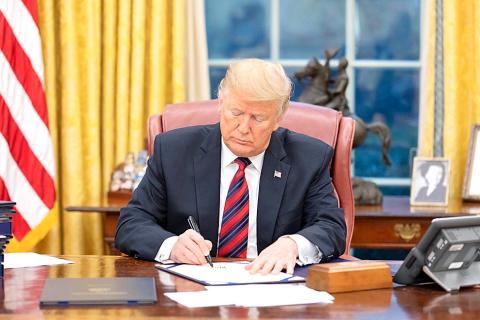The Ministry of Foreign Affairs yesterday thanked the US for its support for Taiwan, after US President Donald Trump signed legislation aimed at enhancing the US’ influence in the Indo-Pacific region and reaffirming Washington’s commitment to Taiwan, particularly arms sales.
The timing of the signing was especially significant, as this year marks the 40th anniversary of the enactment of the Taiwan Relations Act, the ministry said, adding that Taiwan looks forward to deepening its ties with the US, as well as cooperation with like-minded nations in the region to promote peace, prosperity and stability.
Trump on Monday signed into law the Asia Reassurance Initiative Act and 12 other bills, the White House announced, although the US president seemed eager to make clear he would not be constrained by the bill’s demands that the US be more engaged in the region.

Photo: CNA / Photo provided by the White House
“Several provisions of the act ... purport to dictate the policy of the United States in external military and foreign affairs, or to require the executive branch to undertake certain diplomatic initiatives with international partners,” Trump said in a statement. “My administration will treat these provisions consistent with the president’s exclusive constitutional authorities as commander in chief and as the sole representative of the United States in foreign affairs.”
The bill was introduced in April by US senators Cory Gardner, Ed Markey, Marco Rubio and Ben Cardin.
It serves as a policy framework to enhance US leadership in the Indo-Pacific region and to demonstrate a commitment to a free and open Indo-Pacific and rules-based international order, Gardner said.
Section 209 of the bill states that it is the policy of the US to support the close economic, political and security relationship with Taiwan.
It is US policy “to faithfully enforce” all existing US government commitments to Taiwan, consistent with the Taiwan Relations Act, the three US-China joint communiques and the “six assurances” agreed to by former US president Ronald Reagan, the bill says.
It further reiterates US policy as countering efforts to change the “status quo” and supporting “peaceful resolution acceptable to both sides of the Taiwan Strait.”
On arms sales to Taiwan, the act says that the US president should conduct regular transfers of defense articles to Taiwan that are tailored to meet the existing and likely future threats from the People’s Republic of China.
That should include “supporting the efforts of Taiwan to develop and integrate asymmetric capabilities, as appropriate, including mobile and cost-effective capabilities, into its military forces,” the bill says.
It also urges the US president to encourage the travel of high-level US officials to Taiwan, in accordance with the Taiwan Travel Act.
Additional reporting by Lu Yi-hsuan

A magnitude 7.0 earthquake struck off Yilan at 11:05pm yesterday, the Central Weather Administration (CWA) said. The epicenter was located at sea, about 32.3km east of Yilan County Hall, at a depth of 72.8km, CWA data showed There were no immediate reports of damage. The intensity of the quake, which gauges the actual effect of a seismic event, measured 4 in Yilan County area on Taiwan’s seven-tier intensity scale, the data showed. It measured 4 in other parts of eastern, northern and central Taiwan as well as Tainan, and 3 in Kaohsiung and Pingtung County, and 2 in Lienchiang and Penghu counties and 1

FOREIGN INTERFERENCE: Beijing would likely intensify public opinion warfare in next year’s local elections to prevent Lai from getting re-elected, the ‘Yomiuri Shimbun’ said Internal documents from a Chinese artificial intelligence (AI) company indicated that China has been using the technology to intervene in foreign elections, including propaganda targeting Taiwan’s local elections next year and presidential elections in 2028, a Japanese newspaper reported yesterday. The Institute of National Security of Vanderbilt University obtained nearly 400 pages of documents from GoLaxy, a company with ties to the Chinese government, and found evidence that it had apparently deployed sophisticated, AI-driven propaganda campaigns in Hong Kong and Taiwan to shape public opinion, the Yomiuri Shimbun reported. GoLaxy provides insights, situation analysis and public opinion-shaping technology by conducting network surveillance

‘POLITICAL GAME’: DPP lawmakers said the motion would not meet the legislative threshold needed, and accused the KMT and the TPP of trivializing the Constitution The Legislative Yuan yesterday approved a motion to initiate impeachment proceedings against President William Lai (賴清德), saying he had undermined Taiwan’s constitutional order and democracy. The motion was approved 61-50 by lawmakers from the main opposition Chinese Nationalist Party (KMT) and the smaller Taiwan People’s Party (TPP), who together hold a legislative majority. Under the motion, a roll call vote for impeachment would be held on May 19 next year, after various hearings are held and Lai is given the chance to defend himself. The move came after Lai on Monday last week did not promulgate an amendment passed by the legislature that

Taiwan is gearing up to celebrate the New Year at events across the country, headlined by the annual countdown and Taipei 101 fireworks display at midnight. Many of the events are to be livesteamed online. See below for lineups and links: Taipei Taipei’s New Year’s Party 2026 is to begin at 7pm and run until 1am, with the theme “Sailing to the Future.” South Korean girl group KARA is headlining the concert at Taipei City Hall Plaza, with additional performances by Amber An (安心亞), Nick Chou (周湯豪), hip-hop trio Nine One One (玖壹壹), Bii (畢書盡), girl group Genblue (幻藍小熊) and more. The festivities are to